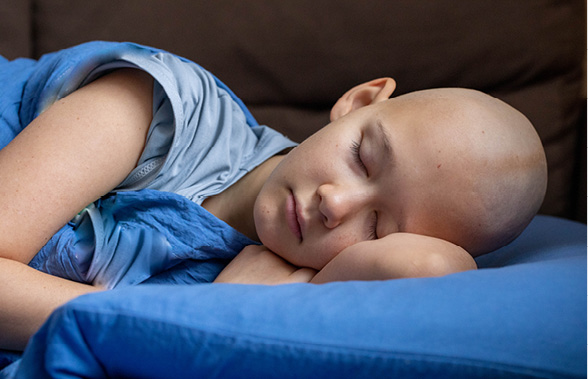Children living with serious illness
When your child has a serious illness, every part of their life is affected. The illness, treatments and side-effects can cause changes to your child’s body, mind, activities, routines and relationships.

When your child has a serious illness, every part of their life is affected. The illness, treatments and side-effects can cause changes to your child’s body, mind, activities, routines and relationships.
- Body
-
- More pain, discomfort, or other symptoms
- Changes to energy and physical abilities
- Changes to senses of smell, taste, touch, hearing, and sight
- Mind
-
- Hard to concentrate or think clearly
- Trouble communicating
- Trouble controlling their body
- Activities
-
- Harder to do everyday activities like coloring or climbing
- Harder to take part in organized activities like sports, music lessons, or clubs
- Routines
-
- Needs more help with daily routines
- Changes to routines when in the hospital
- Not able to take part in usual routines, such as going to school
- Relationships
-
- Not able to see friends and family as often
- Not able to take part in usual activities with friends and family
- Hard to know what to talk about, so relationships feel different
Each of these changes stirs up many different feelings. Most children find it hard to understand what they’re feeling, how to describe feelings, and how to deal with them. They often express their feelings through their behaviour instead. Feelings can change from moment to moment, and these feelings may be the strongest your child has ever felt.
Below are some common feelings children with serious illness have, and suggestions for how to help your child understand and deal with these strong feelings. You may also want to refer to the following additional resources.
Read more
Resources
- Staying Connected Handbook (pages 37-44) - Brain Child
Your child might have strong feelings about the fact that their body isn’t working the way it used to work. They might be afraid of how things are going to continue to change. They might be frustrated because they need more help or can’t be as independent as they want to be.
How to help
- Tell your child that all the feelings they have – no matter what they are – are natural and normal
- Teach the words. Help your child name different feelings. This is called developing an emotional vocabulary:

- Tell your child you have some of these feelings too. Share an example of when you felt frustrated, angry, sad or afraid. Show your child that it’s okay to have a range of feelings. There is no right or wrong way to feel but there are right and wrong ways to act out those feelings.
Your child may feel helpless and out of control about what is happening to their body, how they’re feeling, and how their family members are affected by the illness.
How to help
- Give your child control over smaller choices like:
-
- How to decorate their hospital room
- Which socks to wear, what book to read
- Whether or not they want to visit with someone
- Give your child as much control over bigger choices as possible:
-
- Ask your child how and where they would like to spend their time
- Ask how your child feels about different treatment options
- If your child is non-verbal, “listen” to their preferences through their body language and behaviours
- Look for things your child can do on their own to feel independent.
Your child might feel jealous of siblings or peers who can do the things your child wants to do, but can’t because of the illness. Sometimes children worry that being jealous of a healthy sibling means they want that sibling to be sick. That feeling may make them feel guilty.
How to help
- Tell your child that many people – even adults – feel jealous of others. Explain that wishing to be healthy is not the same as wishing that someone else will get sick. No one can cause their own or someone else’s illness just by thinking or wishing it.
- If your child is jealous that their siblings or friends can do things that they aren’t allowed to do, help them understand the reasons why, so they don’t think they’re being punished. For example, explain that they can’t go to the mall with friends when their immune system is weak.
- It’s important to show your child that you understand why they feel jealous. But at the same time, it can be helpful to try to find creative ways to overcome any limitations that are making them feel this way. For a child who was active on a sports team, this could look like moving from the role of a player to a coach.
People can feel guilty after they do something wrong or even when they think they've done something wrong. Some children feel they did something to cause the illness and they feel guilty about how the illness affects others. They might also feel guilty if they hurt someone’s feelings because of the way they expressed strong feelings like anger or frustration.
How to help
- Tell your child that people sometimes feel guilty when they have a serious illness. Try to explore any feelings of responsibility that your child may have about the illness, in case they believe they’ve done something to cause it.
- Tell your child you know they did not want, or cause this illness. Tell them the effects that the illness has on the family are not the child’s fault. The effects are the fault of the illness.
- Children may feel guilty if the way they’ve expressed anger or frustration has hurt someone’s feelings. Talk about how guilt is a way of knowing that you feel sorry about your actions. Explain that there’s nothing wrong with having strong feelings – your child doesn’t have to be sorry for feeling angry or jealous – but they can be sorry for the way they let those feelings out. Help them find other ways to express those feelings without hurting anyone.
- Talk again another time. It usually takes more than one conversation to let go of feelings of guilt.
Miss feeling “normal”
Your child will miss being able to do things the same way that they used to. Some children feel self-conscious because other people see or treat them differently when they are sick. Even when people treat them “better” than before, they usually wish to be treated “normally”.
How to help
- Keep limits and expectations as consistent as possible. You may want to let your child “get away with” more because of all the difficult things they’re going through. But having the same rules and expectations can be comforting to your child. Your behaviour will tell your child that even though so much has changed, limits and expectations have stayed the same. It’s easier for your child to control their behaviour when they know how you will respond. Each family will need to find the balance that works best for them, but in general most children appreciate the guidance that comes with clear limits and rules.
- People may bring gifts to show their love, or to make your child’s experience easier. These gifts can cause problems. Too many gifts may create unrealistic expectations for your child, and may make siblings feel jealous. Lots of gifts can add to your child’s feeling that things are “different” and unfamiliar. Tell others that the most helpful thing they can do is to spend time with your child to offer attention and support.
Miss doing “normal stuff”
Your child will miss normal, day-to-day activities like going to school, feeding the dog, or using their own bed or shower if they’re in a hospital or hospice. They will also miss things like being able to have “normal” conversations with friends and being able to go out without worrying about germs or other risks.
How to help
- Keep routines as predictable as possible. Even when routines need to change, use a calendar or tell the child about appointments, nursing visits or visitors.
- Do normal activities in a different way so your child can take part. For example, have a sleepover in the hospital, or a movie night in your child’s bedroom. Let your child go to school for a short time to see friends, or go and watch their team play, even if they can’t join in. Each child is different. Some children feel sad or uncomfortable when they do “normal” activities in a different way. For example, some children like going to school for short periods, but others dislike the feeling of being the centre of attention when they are at school. Talk together about what would feel best for your child.
Miss being with people
It is very hard for children to be separated from familiar or favourite people. Even when they’re together your child may feel distant or uncomfortable if they can’t do the same things that they used to do. Even when they are surrounded by friends and family, children sometimes feel lonely because no one else knows exactly how they feel.
How to help
- Help your child spend as much time as they have energy for to be with people they care about. Arrange in-person visits at home or in the hospital or hospice. Encourage them to talk on the phone or with video chats.
- Set up activities if your child feels distant or awkward with friends or family they haven’t seen for awhile. Choose things they can do together to “break the ice,” like a game, craft or movie night.
Just like you, your child may worry about things that will happen, like hospital visits or treatments, or things that might happen to their bodies, routines, activities, and relationships. Many children worry about whether they are going to die and when it will happen. Sometimes children think that talking about their worries out loud will make them happen.
How to help
Let your child know that you would like to be able to talk about any worry they might have. Tell them:
- You won’t be angry with them no matter what they tell you.
- Saying things out loud won’t make them come true.
- It is better to feel worried or sad together, than to feel that way alone. No matter what they might be thinking or worrying about, you’d like to share it with them.
- It’s tempting to want to say “you don’t have to worry about that” if your child shares something that’s hard to talk about, like dying. But doing so rarely makes the worry go away. Instead, you will unintentionally send the message that this is not something they can talk about with you.












